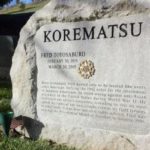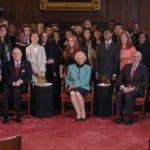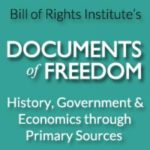On December 18, 1944, the U.S. Supreme Court handed down one of its most controversial decisions when it upheld the government’s decision to intern all persons of Japanese ancestry (both alien and nonalien) on the grounds of national security. Over two-thirds of the Japanese in America were citizens and the internment took away their constitutional rights. In this lesson, students evaluate the consequences of past events and decisions related to the Supreme Court case Korematsu v. United States (1944). They consider the challenges involved when trying to balance civil liberties and national security during threatening times and reflect on the lessons learned about civil liberties from the justices in the Korematsu case.
You Can’t Say That: Right to Know vs. Security Risk

Explain to students that tensions between the press and the military have always existed, as the goals of each group are often in conflict. Reporters want information to flow freely, while the military guards national security interests. The debate over how to balance these competing interests continues today.
Search and Seizure Cartoon Analysis
Spark a conversation about the balance between national security and Fourth Amendment rights with this quick cartoon of Lady Liberty.
Rights at Risk in Wartime
The terrorist attacks on Sept. 11, 2001, stunned the nation. As commander-in-chief, President George W. Bush responded quickly but soon all three branches of government would be embroiled in the struggle to balance national security with the protection of individual liberties amid a war on terror. This lesson plan is based on the Annenberg Classroom video “Habeas Corpus: The Guantanamo Cases.” The four cases are examples of how the Supreme Court, the president and Congress fought to balance national security and civil liberties during the war on terror. At the heart of each case was the constitutional right of habeas corpus, the right to have one’s detention or imprisonment reviewed in court.
Korematsu and Civil Liberties

This documentary explores the landmark case Korematsu v. U.S. (1944) concerning the constitutionality of presidential executive order 9066 during World War II that gave the U.S. military the power to ban thousands of American citizens of Japanese ancestry from areas considered important to national security. A PDF lesson plan accompanies this video.
A Conversation on the Importance of the Japanese Internment Cases

Justices Stephen G. Breyer, Sandra Day O’Connor and Anthony M. Kennedy discuss two landmark cases, Korematsu v. U.S. and Hirabayashi v. U.S., in which the Supreme Court tried to strike a balance between individual rights and national security during wartime. The cases stem from President Franklin Roosevelt’s 1942 executive order that mandated the relocation of Japanese and Japanese Americans to internment camps. This video complements the documentary Korematsu and Civil Liberties.
Voices of History
Voices of History is a collection of eight Bill of Rights Institute curriculum resources including Being An American, Preserving the Bill of Rights, Founders and the Constitution, Supreme Court DBQs, Liberty and Security in Modern Times, Religious Liberty: An American Experiment, and Heroes and Villains. Teachers will have free access to each resources’ lessons plans and handouts.
Civic Conversations
How do educators invest in productive, deep, and transformative dialogue in their classrooms? Civic Conversations is a collaboration between the Edward M. Kennedy Institute’s civic education programming and the community-building dialogic structure practiced by Essential Partners. Explore resources, activities, and lesson structures that support educators as they facilitate difficult conversations, create inclusive learning environments, raise complex discussions, and promote a safe space for students to consider their values and engage in their communities. Policy simulations at the Kennedy Institute reflect the wide range of issues that face our country today. Students debate the best way to reform our immigration system, consider the balance between privacy and security, and think about how to meet the challenge of climate change. As in the real Senate, it’s natural that students will disagree on the best approach to many civic issues. This collection of resources will support educators as they prepare to discuss civic issues, either in preparation for a Kennedy Institute field trip or to practice listening, sharing, and learning in the classroom.
Core Documents Collection: The Cold War
This collection of documents on the Cold War continues TeachingAmericanHistory.org’s extended series of document collections covering major periods, themes and institutions in American history and government. The volume covers American aid to Europe in the early years of the Cold War and American intervention in subsequent years in conflicts around the world to contain the spread of Soviet power. Its documents also explore the dometic effects of the Cold War, chronicling how national security concerns affected relations between American citizens and between Americans and their government. Each volume includes:
Key documents on the period, theme or institution, selected by an expert and reviewed by an editorial board
A thematic table of contents, showing the connections between various documents
Study questions for each document as well as questions that refer to other documents in the collection
Notes on each document to identify people, events, movements, or ideas to improve understanding of the document’s historical context
Documents of Freedom: History, Government, and Economics Through Primary Sources

This complete online textbook covers American history, government, and economic concepts. Resources include readings for students, activity directions for teachers, and handouts that are downloadable and printable for classroom use. Content is geared toward students in grades 8-12. All materials are aligned with Common Core and individual state standards.